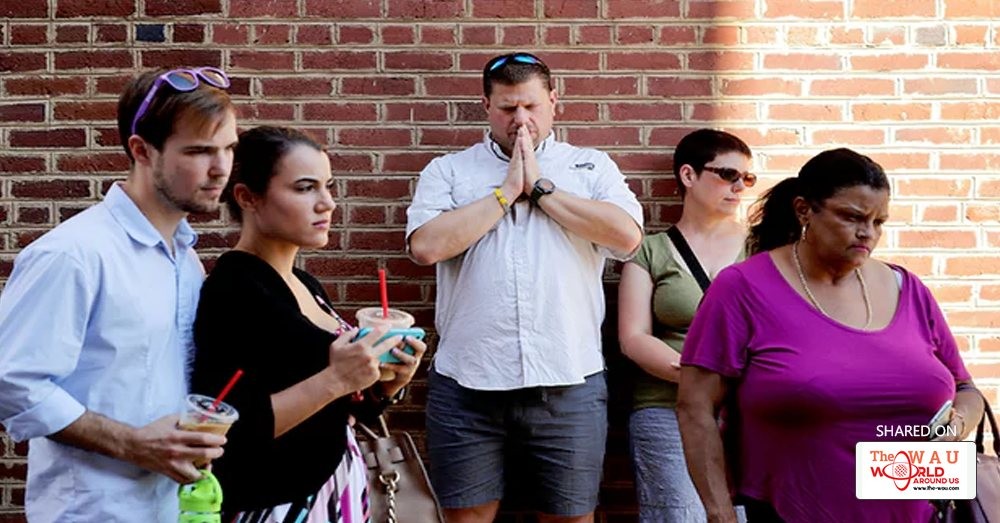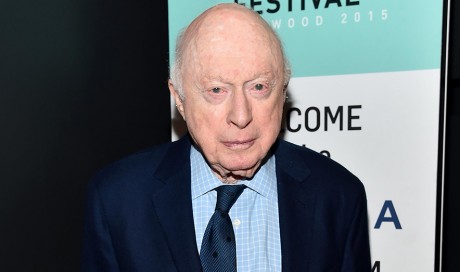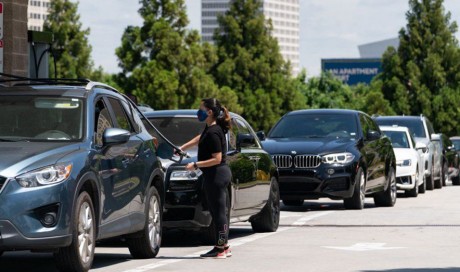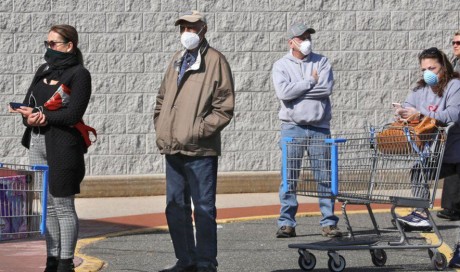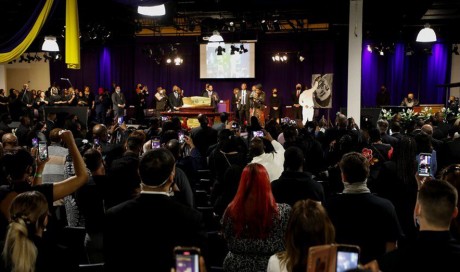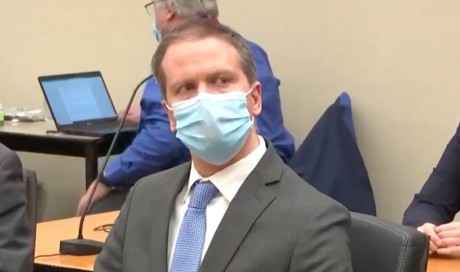Politicians from all sides have rounded on Donald Trump for failing explicitly to condemn white supremacy groups or use the term domestic terrorism after a woman was killed when a car smashed into anti-racism protesters at the weekend. The US Department of Justice has opened a civil rights investigation into the death.
On Saturday the president condemned hatred and violence “on many sides” in his remarks, but did not directly single out the white supremacists, whose attempt to hold a major rally in Charlottesville, Virginia resulted in the governor, Terry McAuliffe, a Democrat, calling a state of emergency. Disorder including clashes with counterprotesters left more than 30 injured.
The woman who was killed by the car that ploughed into counter-protesters was named as 32-year-old Heather Heyer, a legal assistant who had repeatedly championed civil rights issues on social media.
A 20-year-old man, James Fields, of Maumee, Ohio, has been charged with her murder. On Sunday photographs taken earlier on Saturday surfaced that showed Fields standing with a neo-Nazi group and holding a shield emblazoned with a far-right emblem.
The failure of Trump to directly blame white supremacists, after some had marched through Charlottesville’s streets shouting, “Hail Trump” while making Nazi salutes, has prompted harsh criticism. Many are urging for the president to make his condemnation more specific, including leading Republicans such as senators Marco Rubio and Cory Gardner and New Jersey’s governor Chris Christie, as well as a slew of Democrats.
Gardner tweeted: “Mr President, we must call evil by its name. These were white supremacists and this was domestic terrorism.” Rubio tweeted there was “nothing patriotic about Nazis ,the #KKK or #WhiteSupremacists It’s the direct opposite of what #America seeks to be.”
Christie, a staunch Trump supporter, wrote: “We reject the racism and violence of white nationalists like the ones acting out in Charlottesville. Everyone in leadership must speak out.”
On Sunday morning talk shows, Tom Bossert, the White House homeland security adviser, defended the president’s statement by suggesting that some of the counterprotesters had also been violent, and only when pressed did he specifically condemn the racist groups.
The White House responded to the criticism on Sunday with a statement that said the president had “said very strongly in his statement yesterday that he condemns all forms of violence, bigotry, and hatred. Of course that includes white supremacists, KKK Neo-Nazi and all extremist groups. He called for national unity and bringing all Americans together.”.
The White House statement was followed hours later by even tougher rhetoric against white nationalists from vice-president Mike Pence. “We have no tolerance for hate and violence from white supremacists, neo Nazis or the KKK,” Pence said on a visit to Colombia. “These dangerous fringe groups have no place in American public life and in the American debate, and we condemn them in the strongest possible terms.”
Ivanka Trump, the president’s daughter and also a White House aide, meanwhile, did criticise the groups directly, tweeting, “There should be no place in society for racism, white supremacy and neo-nazis.”
Trump is on a 17-day “working vacation” at his golf resort in Bedminster, New Jersey, but is sure to face questions about his response and views on white supremacists when he next speaks to journalists publicly.
The president’s short-lived communications chief, Anthony Scaramucci, also added his voice to the criticism of Trump’s response , and speculated about the future of Steven Bannon, the White House chief adviser who previously served as the executive chairman of the far-right news site Breitbart. On ABC’s This Morning with George Stephanopoulos, Scaramucci said of Trump’s Saturday comments from Bedminster: “I wouldn’t have recommended that statement.” He added, “I think he would have needed to have been much harsher.”
Scaramucci continued: “With the moral authority of the presidency, you have to call that stuff out,” He went on to say there’s “this sort of “Bannon-bart” influence” in the White House that “is a snag on the president.” When asked by Stephanopoulos if that influence stemmed from Bannon, Scaramucci replied, “I think the president knows what he’s going to do with Steve Bannon.”
Hundreds of white nationalists marched through Charlottesville on Friday evening and onto the campus of the University of Virginia there, bearing torches and chanting, “You will not replace us.” Then they gathered again on Saturday morning, some carrying KKK and Confederate flags, to converge on a local park.
The white nationalists had assembled in Charlottesville to vent their frustration over the city’s plans to take down a statue of Confederate general Robert E Lee. Many were armed with clubs, wearing paramilitary garb and chanting antisemitic and racist slogans and epithets as they converged on a public park while local police looked on.
Counter-protesters massed in opposition, and a few hours after violent encounters between the two groups, a car drove into a crowd of people peacefully protesting the rally. “Alt-right” activist Richard Spencer and former Ku Klux Klan leader David Duke attended the demonstrations.
Two Virginia state troopers died when their helicopter, which had been flying above the demonstrations, crashed in woods nearby.
Speaking on Sunday, also on CNN, Charlottesville’s mayor, Michael Signer, said: “There are a bunch of folks in the hospital. This is a city that’s grieving. These were people that didn’t need to die.”
Asked whether Trump should bear any responsibility for the rise in openly racist, white nationalist sentiment and displays, Signer, a Democrat, said: “Look at the campaign he ran. Look at the intentional courting of these white nationalist groups and the repeated failure to silence all those different efforts [to bring people together], just like we saw yesterday.”
Added Signer: “There are two words that need to be said over and over: domestic terrorism and white supremacy, and we are not seeing leadership from the White House on this.”
Tom Bossert, the White House homeland security adviser, spoke about the possibility of the death penalty in connection with the killing of Heyer. Speaking to CNN’s State of the Union, he said: “There is a civil rights investigation. We will see where the facts take us. He has been charged with second-degree murder and that could carry a much stiffer penalty if there is evidence to support a civil rights abuse or a hate crime. That could bring the death penalty.”
Far right activists shouted down
Later on Sunday afternoon in downtown Charlottesville, “Unite the Right” rally organiser Jason Kessler attempted to hold a press conference with “alt right” activist leader Richard Spencer. The two had earlier distanced themselves from the accused killer, James Field.
As soon as Kessler emerged in the forecourt of Charlottesville’s city hall, a crowd of more than 300 people who had gathered along with the waiting media began yelling insults at the men. At the microphones, Kessler became increasingly animated but was completely inaudible.
After a few minutes, a crowd of anti-far-right protestors rushed the improvised podium. Kessler fled and made his escape with the protection of waiting state police in riot gear. Behind the line of police, the crowd resumed chanting, “Nazis go home” and “we are unstoppable another world is possible”.
After about 15 minutes when it was clear Kessler had left the downtown area, police and the crowd dispersed. In a nearby ice cream shop, Joe Montoya, a local resident who had been vociferous in the crowd, said he was glad that the city had prevented Kessler from speaking. “This is what our town is like,” he said.
“Charlottesville is a diverse place,” Montoya said. “We come together at times like this. Love wins”
Donald Trump’s father, Fred Trump, is widely believed to have had links to, or at least been an enthusiastic supporter of, the Ku Klux Klan. He was arrested at a Klan rally in New York City in 1927.
The first mention of Donald Trump in the New York Times appears to have been in 1973 when, as president of the Trump Management Corporation that controlled thousands of New York City rental apartments , he countersued the federal government after it accused his family’s company of racial discrimination.
Despite fighting back fiercely, the Trumps with the aid of notorious attorney Roy Cohn, were eventually obliged to alter their renting policies.
Share This Post

